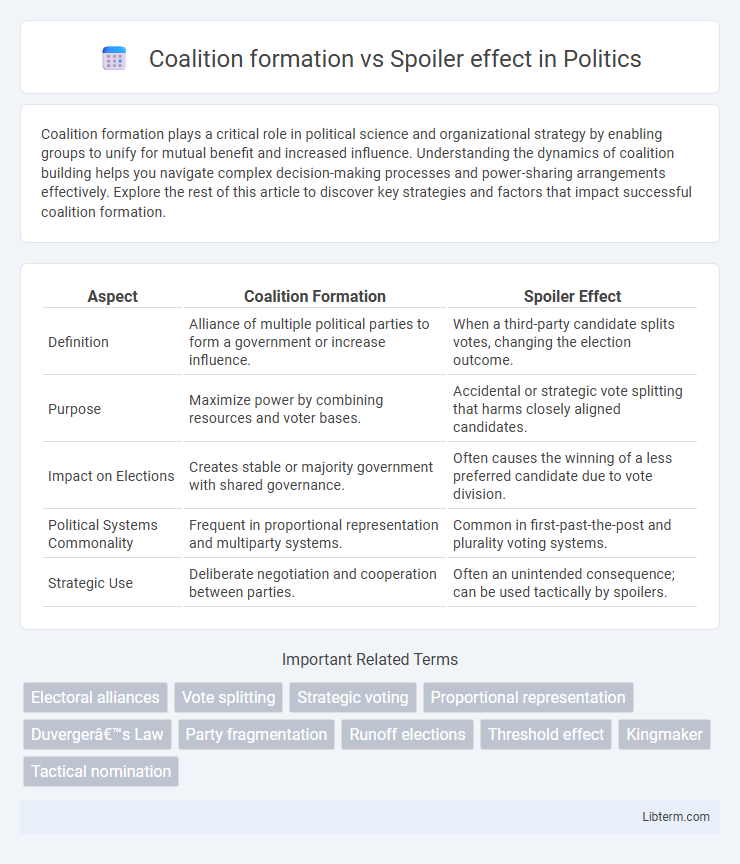Coalition formation plays a critical role in political science and organizational strategy by enabling groups to unify for mutual benefit and increased influence. Understanding the dynamics of coalition building helps you navigate complex decision-making processes and power-sharing arrangements effectively. Explore the rest of this article to discover key strategies and factors that impact successful coalition formation.
Table of Comparison
| Aspect | Coalition Formation | Spoiler Effect |
|---|---|---|
| Definition | Alliance of multiple political parties to form a government or increase influence. | When a third-party candidate splits votes, changing the election outcome. |
| Purpose | Maximize power by combining resources and voter bases. | Accidental or strategic vote splitting that harms closely aligned candidates. |
| Impact on Elections | Creates stable or majority government with shared governance. | Often causes the winning of a less preferred candidate due to vote division. |
| Political Systems Commonality | Frequent in proportional representation and multiparty systems. | Common in first-past-the-post and plurality voting systems. |
| Strategic Use | Deliberate negotiation and cooperation between parties. | Often an unintended consequence; can be used tactically by spoilers. |
Introduction to Coalition Formation and the Spoiler Effect
Coalition formation involves multiple political parties or groups collaborating to achieve a common goal, often seen in parliamentary systems where no single party has a majority. The spoiler effect occurs when a minor party candidate draws votes away from a major candidate, potentially altering the election outcome. Understanding coalition formation helps mitigate the spoiler effect by encouraging alliances that consolidate voter support and prevent vote splitting.
Defining Coalition Formation in Electoral Systems
Coalition formation in electoral systems refers to the process where multiple political parties or groups collaborate to achieve a majority or governing power, often by pooling their resources and voter bases. This strategic alliance helps smaller parties influence policy decisions and legislative outcomes by joining larger coalitions. Unlike the spoiler effect, which can split votes and harm similar candidates, coalition formation seeks to unite interests to maximize electoral success and governance stability.
Understanding the Spoiler Effect in Elections
The spoiler effect occurs when a third-party candidate draws votes away from a major candidate, potentially causing the election of a less preferred candidate. Coalition formation mitigates this by encouraging parties to unite, consolidating votes to avoid splitting the electorate. Understanding the spoiler effect highlights the importance of strategic alliances in plurality voting systems to maximize electoral success.
Comparative Analysis: Coalition Dynamics vs Spoiler Phenomena
Coalition formation involves parties combining forces to secure a majority, often leading to stable governance and shared power, while the spoiler effect typically occurs when a third-party candidate splits the vote, potentially causing a less preferred candidate to win. In coalition dynamics, strategic negotiations and policy alignments enhance electoral influence, contrasting with spoiler phenomena where vote division diminishes a party's overall impact. Understanding these mechanisms highlights how coalition-building fosters collaboration, whereas the spoiler effect reveals risks inherent in multi-candidate contests.
How Electoral Systems Influence Coalition Building
Electoral systems significantly shape coalition formation by determining party incentives and voter representation mechanisms. Proportional representation systems encourage multi-party collaboration, increasing the likelihood of coalition governments, while first-past-the-post systems often lead to two-party dominance, intensifying the spoiler effect. The spoiler effect arises when minor party candidates split votes, potentially altering election outcomes and discouraging coalition building in plurality-based elections.
Impact of the Spoiler Effect on Election Outcomes
The spoiler effect significantly alters election outcomes by splitting votes among similar candidates, often enabling a less popular candidate to win due to vote dilution. In contrast, coalition formation strategically unites parties or candidates to consolidate votes, minimizing the risk posed by spoilers and enhancing overall electoral strength. Understanding these dynamics is crucial for analyzing candidate strategies and predicting election results in multi-party systems.
Strategies to Mitigate the Spoiler Effect
Coalition formation involves parties collaborating to consolidate votes, thereby reducing fragmentation and improving electoral success by combining resources and policy platforms. Strategies to mitigate the spoiler effect include implementing ranked-choice voting, which allows voters to rank candidates by preference and ensures that votes for less popular candidates are not wasted but transferred to others. Electoral reforms such as fusion voting and strategic alliances further help unify similar political entities, minimizing vote splitting and preventing spoilers from disadvantaging aligned parties.
The Role of Minor Parties in Coalition Formation
Minor parties play a crucial role in coalition formation by acting as kingmakers in closely contested elections, where their support can secure a legislative majority. Their strategic positioning often forces major parties to negotiate policy concessions and power-sharing agreements, mitigating the spoiler effect that might otherwise fragment the vote. By leveraging their influence, minor parties help stabilize governance structures and enhance representational diversity within coalition governments.
Case Studies: Coalition Successes and Spoiler Scenarios
Coalition formation often leads to electoral success by uniting fragmented voter bases, as demonstrated in Germany's 2017 federal election where the CDU/CSU alliance secured a stable majority, contrasting with spoiler effect scenarios like the 2000 U.S. presidential election where Ralph Nader's Green Party candidacy siphoned crucial votes from Al Gore, influencing George W. Bush's victory. Case studies highlight that effective coalition-building mitigates vote splitting and enhances policy influence, whereas spoiler effects fragment opposition votes, leading to unintended electoral outcomes. Strategic alliances in parliamentary systems typically overcome spoiler risks by consolidating support, whereas fragmented third-party candidacies are more prone to alter election trajectories negatively.
Policy Implications and Recommendations for Future Elections
Coalition formation often leads to more stable governance by encouraging compromise among parties with overlapping policy goals, which can reduce the spoiler effect where vote splitting weakens similar candidates. Policy implications include designing electoral systems that incentivize alliances or threshold rules to minimize wasted votes and promote representational fairness. Future elections should consider mixed-member proportional systems or ranked-choice voting to balance coalition benefits and mitigate spoilers, ensuring inclusive yet decisive outcomes.
Coalition formation Infographic

 libterm.com
libterm.com